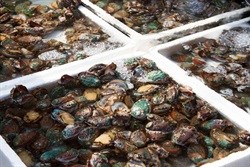
Top stories






More news
















Logistics & Transport
Uganda plans new rail link to Tanzania for mineral export boost










The DIFS attributes much of the success of its well established and internationally recognised PhD programme to an approach which sees its researchers tackling the kind of research that the industry and the farmers on the ground want. This also makes them a good match for the ACP-EU Edulink II programme, a project partnership between Lilongwe University of Agriculture and Natural Resources (LUANAR) in Malawi, the University of Eldoret in Kenya, Makarere University in Uganda and Rhodes University. The collaboration between these universities is intended to create and fine tune fit for purpose PhD curricula in aquaculture and fisheries science. The broader objective is to improve food and nutrition security through increased fish production and sustainable resource management.
"Our approach in aquaculture research at the DIFS is to get away from the ivory tower concept," said Dr Cliff Jones. "Our research questions do not originate from university laboratories. We have developed relationships with the farmers who we work with and research topics arise from discussions over the real challenges faced by our farmers in the everyday running of their operations."
Working with key role-players around southern Africa with a main cluster of abalone farmers in Hermanus, the DIFS ability and willingness to form these partnerships with individual farmers and the commercial industry has led to the development of very successful MSc and PhD curricula at Rhodes. "It is this approach we wish to use in pioneering the development of the Edulink PhD curricula at other African universities," said Dr Jones.
The success of the DIFS curriculum is equally built on the development of relationships with other academic departments and institutions. With just six permanent tenured staff, DIFS has the capacity to supervise a school of about 60 postgraduates because they are linked up to supervisory teams of experts each in their own particular field in other departments and at other institutions.
"Collaboration is a two-way thing and makes for very exciting research relationships," said Dr Jones. "You have got to develop your relationships in order to grow your capacity and expertise in a particular field. The partnership is in fact a mentorship too and the additional expertise and manpower means the learning process is mutual - I have already learned so much from our partners."
Another benefit is the ability to share capacity and resources: "We need to share human capacity and resources. Rather than compete with each other, Europe, Asia and the USA, we need to pool our own resources in Africa and ensure that we, as a continent, can offer a product that compares internationally".
This approach will go a long way to seeing Africa pooling its resources and developing African solutions to food security and sustainability issues faced by the aquaculture industries. The Regional University Forum (RUFORUM) already provides a solid framework in which the project will operate to great benefit. The Forum, which places an emphasis on agriculture and development of agricultural research in Africa, has a membership of over 40 African Universities whose common goal is to share resources.
Rhodes is not currently a member of RUFORUM but Dr Jones believes their collaborative approach will be a force to be reckoned with in time to come. Although Rhodes does not have an Agriculture Faculty, research conducted in entomology, botany, the Biotechnology Innovation Centre and DIFS, including wild caught fisheries as well as capture fisheries which fall under aquaculture, all contribute substantially to the field agricultural research.
Jones, along with the other partners in this project, attended the biennial RUFORUM Conference on behalf of the project where this theme came across strongly. "RUFORUM is a group of universities that have a common goal to share resources and to do work for Africa," explained Dr Jones. "While we certainly need to develop relationships with Europe, Asia and the states, we need to place emphasis on developing relationships that draw on and enhance the expertise and capacity within Africa first."